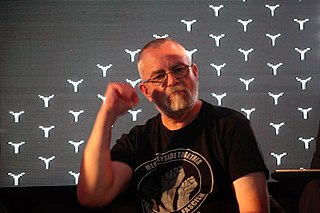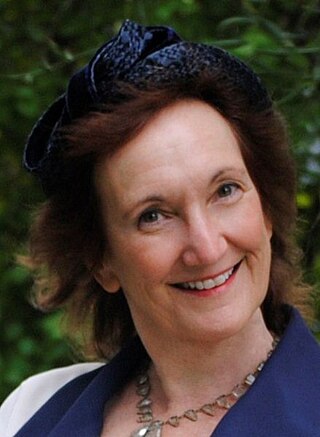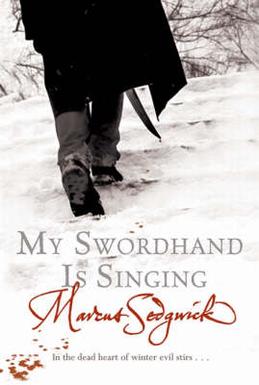The Carnegie Medal for Writing, established in 1936, is a British literary award that annually recognises one outstanding new English-language book for children or young adults. It is conferred upon the author by the Chartered Institute of Library and Information Professionals (CILIP), who calls it "the UK's oldest and most prestigious book award for children's writing". CILIP is currently partnered with the audio technology company Yoto in connection with the award.
The John Llewellyn Rhys Prize was a literary prize awarded annually for the best work of literature by an author from the Commonwealth aged 35 or under, written in English and published in the United Kingdom. Established in 1942, it was one of the oldest literary awards in the UK.
The Guardian Children's Fiction Prize or Guardian Award was a literary award that annual recognised one fiction book written for children or young adults and published in the United Kingdom. It was conferred upon the author of the book by The Guardian newspaper, which established it in 1965 and inaugurated it in 1967. It was a lifetime award in that previous winners were not eligible. At least from 2000 the prize was £1,500. The prize was apparently discontinued after 2016, though no formal announcement appears to have been made.
The Nestlé Children's Book Prize, and Nestlé Smarties Book Prize for a time, was a set of annual awards for British children's books that ran from 1985 to 2007. It was administered by BookTrust, an independent charity that promotes books and reading in the United Kingdom, and sponsored by Nestlé, the manufacturer of Smarties candy. It was one of the most respected and prestigious prizes for children's literature.
Audrey Lilian Barker FRSL was an English novelist and short story writer. She was born in St Pauls Cray, Kent and brought up in Beckenham. She was an only child. When Barker turned 16 her father sent her to work at a clockmaking firm, as he did not approve of her seeking further education. She worked in the editorial office of Amalgamated Press, as publisher's reader for Cresset Press, and at the BBC as a subeditor. During her lifetime she published ten collections of short stories and eleven novels, one of which - John Brown's Body - was shortlisted for the Booker Prize in 1970. She was also the winner of the inaugural Somerset Maugham Prize in 1947, with her collection of short stories called Innocents. In 1962 Barker won the Cheltenham literary festival award. Barker was also elected a fellow of the Royal Society of Literature in 1970. Barker's work often included themes such as love, good vs. evil, youth vs. experience, and explored children as both the catalyst and victims of events. While not commercially successful during her lifetime, her writing has been well regarded by the literary critics and other authors over time.

Alan Albert Gibbons is an English writer of children's books and campaigner known for his advocacy of libraries.

Sonya Sones is an American poet and author. She has written seven young adult novels in verse and one novel in verse for adults. The American Library Association (ALA) has named her one of the most frequently challenged authors of the 21st century.
Marcus Sedgwick was a British writer and illustrator. He authored several young adult and children's books and picture books, a work of nonfiction and several novels for adults, and illustrated a collection of myths and a book of folk tales for adults. According to School Library Journal his "most acclaimed titles" were those for young adults.

My Swordhand Is Singing is a novel written by Marcus Sedgwick, set in the early 17th century. It won the 2007 Booktrust Teenage Prize. It was also shortlisted for the CILIP Carnegie Medal in 2007. Inspired by the original vampire folklore of Eastern Europe, the novel follows the story of Peter, the son of drunkard woodcutter Tomas, and his life in the seemingly normal village of Chust. He and his father travel from place to place, living a nomadic life. They have been working in Chust for over a year when things start to happen — things unexplainable, but things Tomas seems to know about.

Yiyun Li is a Chinese-born writer and professor in the United States. Her short stories and novels have won several awards, including the PEN/Hemingway Award and Guardian First Book Award for A Thousand Years of Good Prayers, and the 2020 PEN/Jean Stein Book Award for Where Reasons End. She is an editor of the Brooklyn-based literary magazine A Public Space.
The Booktrust Teenage Prize was an annual award given to young adult literature published in the UK. The prize was administered by Book Trust, an independent charity which promotes books and reading. The Booktrust Teenage Prize was last awarded in 2010 and is no longer running.

Anthony John McGowan is an English author of books for children, teenagers and adults. He is the winner of the 2020 CILIP Carnegie Medal for Lark.

The Ghosts of Heaven is a novel by Marcus Sedgwick, published on 2 October 2014. The book is divided into four brief quarters, with each part telling a different story. The book circles around the idea "Spirals are everywhere". The story begins in the past and ends in the future, essentially the development of mankind. The novel was shortlisted for the 2015 Carnegie Medal and received a Michael L. Printz Honor Award in 2016.
The Winner's trilogy is a trilogy of young adult fantasy novels by Marie Rutkoski, which includes The Winner's Curse (2014), The Winner's Crime (2015), and The Winner's Kiss (2016), as well as the short story prequel, Bridge of Snow (2014).

My Name Is Mina is a 2010 children's novel by David Almond. It is a prequel to Skellig and is about Mina, a homeschooled girl who lives across the road from the house that Michael's family moves into at the beginning of Skellig. The novel takes the form of a stream of consciousness journal. It is written in a way that shows us Mina's opinions.

Beetle Boy is a 2016 middle grade novel written by M. G. Leonard, illustrated by Júlia Sardà, and published by The Chicken House and Scholastic.

Angie Thomas is an American young adult author, best known for writing The Hate U Give (2017). Her second young adult novel, On the Come Up, was released on February 25, 2019.

Out of Shadows is a 2010 children's historical novel by Jason Wallace, published by Andersen Press on 28 January 2010. Set in 1980s Zimbabwe, the story follows white teenager Robert Jacklin at a prestigious boarding school as he confronts bullying, anti-black racism, his own morality and the political instability of the time. His debut novel, it is partly inspired by Wallace's own experiences attending a boarding school in Zimbabwe after the civil war. The novel was rejected by publishers one hundred times before being published by Andersen Press. The novel received favourable reviews and won the 2010 Costa Book Award for Children's Book, the 2011 Branford Boase Award and the 2011 UKLA Book Award. It was also shortlisted for the 2010 Booktrust Teenage Prize and the 2011 Carnegie Medal.
This article presents lists of the literary events and publications in 2022.










